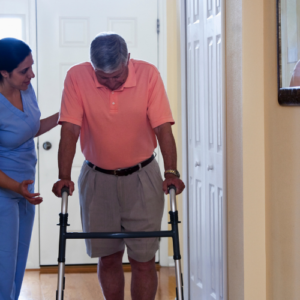Blog
A Day in the Life of a Palliative Care Nurse Practitioner
The growth of palliative care services in the United States equals increased demand for palliative care nurse practitioners, who play a vital role in delivering…
Promoting Better Clinicians Through Care at Home
The rapid growth of the continuum of healthcare in the home since the COVID-19 pandemic is testament to the success of this approach to care….
Why Telehealth is a Win for Providers
The rise of telehealth during the COVID-19 pandemic came out of absolute necessity, and with that rise came rapid advances in how, where, how often…
Reducing Isolation and Loneliness with Care at Home
It is fair to say that in the United States today, there is an epidemic of loneliness and isolation affecting a substantial number of adults….
Remote Patient Monitoring: Vital Tools for Providers
It might seem difficult for clinicians to monitor patients 24/7 outside of a traditional clinical setting, but advancements in technology are enabling providers to be…
How Unique Care in the Home Reduces Nursing Burnout
Nursing shortages have been a national topic of discussion for many years and continue to dominate healthcare circles. A high-burnout profession driven to new extremes…
Lessons From a Joint Venture Approach to Care at Home
Care-at-home treatment models have taken root and rapidly expanded in scope in the past few years, accelerated by the effects of the COVID-19 pandemic. It…
Contessa and Nursing Innovation: Helping Nurses Commute in NYC
As part of its Comprehensive Care at Home, Contessa provides nursing staff for in-home visits to patients in various regional settings nationwide. In the New…
How Hospital at Home Can Improve Patient Outcomes
Hospital-level care in the home has gained popularity in the United States following a surge in health systems building programs to provide this care delivery…
Rehabilitation Care at Home: Beyond Home Health
Traditionally, patients that require medically-necessary rehabilitation care are offered placement in a skilled nursing facility (SNF) or subacute rehab (SAR) to receive these services. In…
Care at Home, Dementia, and Reducing the Risk of Deconditioning
Deconditioning, or a decline in physical fitness and wellness during a hospital stay, is challenging for anyone but especially difficult for people living with dementia….
Rehabilitation Care at Home and its Value to Communities and Hospitals
In 2017 Contessa introduced a unique alternative to subacute rehabilitation (SAR) and traditional skilled nursing facilities (SNFs): our Rehabilitation Care at Home program. Now into…












